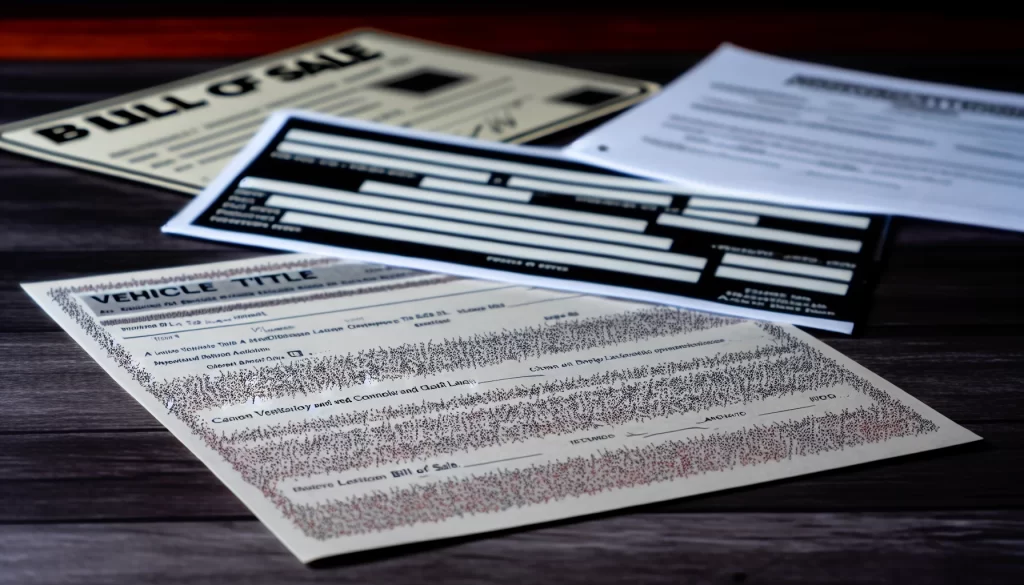Have you ever dealt with the sale of a junk car? Completing a bill of sale for junk car transactions is a crucial step that many people often overlook. In this blog post, we’ll guide you through the entire process, ensuring that both parties are protected and the transaction runs smoothly.
Key Takeaways
- Craft a legally binding bill of sale for your junk car, including details of both parties, vehicle specifics and purchase price.
- Adhere to state-specific requirements to protect the rights of buyer & seller. Finalize transaction by signing documents and providing original title (if available).
- Prepare the car for sale by cleaning, removing items & providing proof of service history.
Crafting a Bill of Sale for Your Junk Car

A bill of sale serves as a legally binding document that demonstrates the sale and transfer of ownership of a vehicle from the owner to the buyer. Creating a detailed and precise bill of sale is vital for the protection of all parties involved in the transaction. It helps in transferring the vehicle title to the new owner and offers evidence of warranty coverage and no longer being accountable for the vehicle if it is stolen or damaged. In most cases, a handwritten bill of sale is valid so long as all necessary information is included and recognized by the DMV.
To complete a bill of sale for a motor vehicle, including junk cars, you need to follow a relatively straightforward process. This blog post will cover the key information to include, the ways to safeguard both parties, and the steps to finalize the transaction.
Key Information to Include
A comprehensive junk car bill of sale should include essential information relating to both the buyer and seller. This generally encompasses:
- Complete names and contact details of both parties
- Specific vehicle information such as make, model, year, and VIN
- Date of sale
- Agreed purchase price or compensation
All of this information should be recorded in the bill of sale.
Beyond the basic information, a comprehensive vehicle description is necessary. This should comprise the car’s mileage, body and engine condition, and any indications of exterior or interior damage. If the original title is missing, a car title in the form of a duplicate title may be required.
In the end, making sure all required information is included in the bill of sale will significantly ease the transaction process.
Protecting Both Parties
A bill of sale serves as a legal document that proves the sale and transfer of ownership, safeguarding both the buyer and seller. In the absence of a vehicle’s title, alternative proof of ownership, such as registration papers or insurance documents, may be utilized. Acquiring a new registration from the Department of Motor Vehicles is needed to prevent any legal issues, particularly if the vehicle’s title is not available.
Requirements for notarization in junk car sales vary by state, so consulting your local DMV for more information on the necessary documents is advised. By ensuring that all necessary information is included in the bill of sale and adhering to state-specific requirements, you can effectively protect the interests of both the buyer and seller.
Finalizing the Transaction
To conclude the junk car transaction, make sure to follow these steps:
- Sign the bill of sale: Both the buyer and seller should sign the bill of sale document.
- Provide copies: Make sure to provide copies of the signed bill of sale to both parties.
- Provide the original title: If available, provide the original title of the junk car to the buyer.
- Notarization (if required): In some cases, notarization may be required for a junk car bill of sale. This involves the seller and buyer appearing in person before a Notary Public, who verifies their identities and witnesses their signatures on the document.
Notarization requirements for junk car sales differ by state, so it is essential to consult with your local DMV or research state-specific laws to ascertain the requirements in your state. By adhering to these guidelines and following the necessary steps, you can finalize the transaction and successfully transfer ownership of the junk car.
The Legalities of Selling a Junk Car Without a Title
Selling a junk car without a title can be a complex process, as it may indicate that the vehicle was never titled or was lost at some point. Although it is inadvisable to purchase a vehicle with only a bill of sale and no title, some legal options are available for the sale of a junk car without a title, such as applying for a replacement title, selling to a junkyard, or obtaining a bill of sale.
In some cases, alternative proof of ownership may be accepted, depending on state requirements. Next, we’ll discuss the circumstances under which a title may not be available and the alternative documents that can be used to prove ownership.
When a Title Isn’t Available
A vehicle title may be unavailable for various reasons, including ineligibility, salvage branding, or loss. In any of these situations, it is crucial to exercise caution and consider obtaining a replacement title. A rebuilt title, for example, can be given to a salvage vehicle that has been repaired and deemed suitable for road use, after obtaining a salvage certificate.
If the title of the vehicle is lost or damaged, a replacement title must be obtained from the local Department of Motor Vehicles (DMV) to continue with the sale. Ensuring that appropriate measures are taken when a title isn’t available can help avoid potential liabilities and complications during the sale process.
Alternative Proof of Ownership
When selling a junk car without a title, alternative proof of ownership can be used depending on state requirements. Accepted documents that may serve as proof of ownership include:
- Vehicle registration
- Bill of sale
- Manufacturer’s certificate of origin
- Proof of vehicle ownership such as a driver’s license, state ID, or passport.
Different states in the US may have varying attitudes towards the use of registration papers as proof of ownership when selling a junk car. It is essential for the vehicle owner, who is also the registered owner, to consult the particular state’s Department of Motor Vehicles (DMV) or pertinent authorities for the regulations and requirements.
How to Legally Sell Your Junk Car

Legally selling your junk car involves gathering the necessary documents, such as:
- The title
- Bill of sale
- Registration papers
- Insurance documents
This will ensure a smooth transaction. Additionally, handling license plates and registration is an important aspect of the process to avoid potential liabilities and ensure the vehicle won’t be used illegally.
The following sections will cover the needed documents for selling a junk car, along with the procedures to handle license plates and registration.
Necessary Documents
The necessary documents for selling a junk car include:
- Title document: Provides evidence of ownership for the vehicle and formally transfers ownership to the buyer.
- Bill of sale: A legal document that records the sale of the vehicle and includes details such as the purchase price and buyer and seller information.
- Registration papers: Furnish identification particulars of the vehicle and are mandatory for the sale of a vehicle.
- Insurance documents: Proof of insurance coverage for the vehicle.
These documents needed are essential for a smooth and legal sale of your junk car.
Insurance documents are also important as they offer relevant information about the car’s coverage and may be required for policy cancellation after the deal with the insurance company. By gathering all the required documents, you can ensure a hassle-free sale and obtain the highest value for your junk car.
Handling License Plates and Registration
Selling a junk car also involves handling license plates and registration. It is crucial to notify the DMV to ensure that your vehicle is taken out of their records and is not liable to any potential penalties or fines. To properly remove the license plates from your junk car, follow these steps:
- Remove the license plates from the front and back of the car.
- Retain the license plates in a secure location.
- Transport the license plates to your local DMV office.
- Submit the license plates, obtaining a receipt as proof.
Deregistering the car and submitting its license plates to the Department of Motor Vehicles is an essential step to prevent any potential misuse or fraud. By following these guidelines, you can legally sell your junk car and avoid any future liabilities.
Dealing with Motor Vehicles Departments

Working with motor vehicles departments can be a crucial aspect of the junk car selling process. It is necessary to comprehend document requests and fees, as well as to report the sale of the vehicle. Each state has its own laws and regulations regarding the procedures for requesting documents and the related fees.
The following sections will examine the document requests and fees required by different states and highlight the importance of reporting the sale to the DMV.
Document Requests and Fees
Document requests and fees vary by state. Each state has its own laws and regulations regarding the procedures for requesting documents and the related fees. Some states may have established fees for document requests, whereas other states may permit agencies to set their own fees based on factors such as:
- duplication
- labor
- document search
- retrieval costs
To understand the document request process and the associated fees, it is imperative to refer to the specific laws and regulations of the state in question. For example, in California, the application fee for obtaining a replacement title is $20, but fees may differ in other states.
Reporting the Sale
Reporting the sale of a vehicle to the DMV is essential to absolve oneself of any liability concerning the vehicle and to thwart any potential fraudulent activities or misuse of personal information connected to the vehicle. The process for reporting the sale typically involves obtaining a bill of sale, filling out the necessary forms, submitting the forms and paperwork, and paying any applicable fees.
It is essential to consult with your local DMV or pertinent government agency for the exact procedures and requirements in your region. By reporting the sale and adhering to the necessary guidelines, you can effectively protect yourself from any potential liabilities.
Preparing Your Junk Car for Sale

Before selling your junk car, it’s important to prepare it for sale. This involves cleaning and item removal, as well as providing proof of service history. Taking these steps can enhance the value and credibility of the car, making it more desirable to prospective buyers.
The following sections will cover the process of cleaning and removing items from a junk car before the sale, and the method of gathering maintenance records to provide proof of service history.
Cleaning and Item Removal
Cleaning your junk car and removing personal belongings is an essential step in preparing it for sale. Here are some tips to follow:
- Check the glove compartment, trunk, and under the seats for any personal items.
- Remove any valuable components or accessories that can be sold separately.
- Give your car a wash and clean out any trash to make it more presentable to potential buyers.
To clean the interior of your junk car, you can use:
- Upholstery cleaner
- Glass cleaner or glass cleaning wipes
- Handheld vacuum
- Microfiber cloth
Dish soap, vinegar, and baking soda can also be used for specific cleaning tasks.
Providing Proof of Service History
Providing proof of service history is essential when selling a junk car, as it offers a tangible record of the care and maintenance that has been undertaken on the vehicle. To prepare a service history document, create a record of the services performed on the car, noting the date, mileage, and details of the services on receipts or a separate document. A release of liability form should also be completed when selling or junking the car.
Having proof of service history can positively affect the value of a junk car, demonstrating that the car has been properly taken care of and maintained. This can give potential buyers confidence in the car’s condition and provide them with a more accurate depiction of its current state.
Summary
In conclusion, completing a bill of sale for junk car transactions is a crucial process that involves gathering necessary documents, protecting both parties, and finalizing the transaction. Preparing your junk car for sale by cleaning and removing items, as well as providing proof of service history, can enhance its value and credibility. By adhering to the guidelines discussed in this blog post and working with motor vehicles departments, you can ensure a smooth and successful sale of your junk car.
Frequently Asked Questions
What are the key elements to include in a bill of sale for a junk car?
A bill of sale for a junk car should include the buyer and seller’s names and contact information, vehicle information, date of sale, purchase price and signatures of both parties.
What is an acceptable alternative to a title when selling a junk car?
Selling a junk car requires proof of ownership, such as vehicle registration, bill of sale, manufacturer’s certificate of origin, driver’s license, state ID, or passport.
How can I obtain a replacement title if the original is lost or damaged?
To obtain a replacement title, contact your local DMV and provide the necessary information. A fee may be applicable.
Do I need to report the sale of my junk car to the DMV?
Yes, you need to report the sale of your junk car to the DMV in order to avoid any potential liabilities and ensure the vehicle won’t be used illegally.
What steps should I take to prepare my junk car for sale?
To prepare your junk car for sale, clean it and remove any personal belongings, valuable components, or accessories. Gather maintenance records to provide proof of service history.





 Who We Are
Who We Are Coverage Area
Coverage Area Donate
Donate